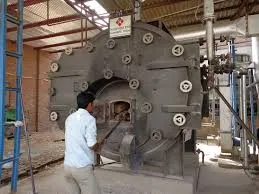
12월 . 11, 2024 05:59 Back to list
Understanding Boiler Temperature Control for Efficient Heating Systems
Understanding Temperature Control in Boilers
Boilers play a crucial role in various industries, providing steam and hot water for a multitude of applications, from heating buildings to powering manufacturing processes. Among the key factors influencing boiler performance and efficiency is the temperature of the water or steam produced. This article delves into the significance of temperature control in boilers, the implications of maintaining optimal temperature levels, and the methods used to achieve precise temperature regulation.
The Importance of Temperature in Boilers
Temperature control in a boiler is vital for several reasons. First and foremost, it directly impacts the efficiency of the boiler. When water is heated to the optimal temperature, the fuel is utilized more effectively, leading to lower energy consumption and reduced operational costs. Conversely, operating a boiler at improper temperatures can result in excessive fuel consumption, higher emissions, and increased wear and tear on the equipment.
Additionally, the temperature of the steam generated in the boiler is critical for steam quality. Superheated steam, which is steam heated beyond its saturation point, is often required for many industrial applications. This type of steam offers higher thermal energy content and reduces the risk of condensation in pipes, ensuring efficient energy transfer during usage.
Consequences of Improper Temperature Management
Inadequate temperature management can lead to several problems. If the boiler operates at temperatures that are too low, this can cause inefficient combustion, leading to the formation of soot and other deposits within the furnace and boiler tubes. Such fouling can significantly diminish heat transfer efficiency, resulting in higher fuel costs and potential damage to the boiler components.
On the other hand, operating the boiler at excessively high temperatures can present safety hazards. High pressures and temperatures increase the risk of accidents, including explosions and equipment failures. Maintaining safe operating temperatures is not just a matter of efficiency; it's also critical for ensuring the safety of personnel and compliance with regulatory standards.
temperature in boiler

Methods for Temperature Control
Effective temperature control in boilers involves various techniques and technologies. One common method is the use of temperature sensors and control systems that continuously monitor the temperature of the water or steam. These sensors provide real-time data, allowing operators to make necessary adjustments to maintain desired temperature levels.
Another method is the implementation of advanced control strategies, such as feedforward and feedback control. Feedforward control anticipates changes in load demand and adjusts the fuel input accordingly, while feedback control responds to actual temperature readings to fine-tune the system. Combining these strategies allows for more precise temperature management, optimizing boiler performance under varying operational conditions.
Moreover, modern boilers often feature automated control systems that enhance temperature regulation efficiency. These systems may include programmable logic controllers (PLCs) that automate the operation of valves, pumps, and fans based on temperature readings and operational parameters.
Conclusion
Temperature control in boilers is not just a technical necessity; it is foundational to the overall efficiency, safety, and effectiveness of the systems. Industries that rely on boilers must prioritize maintaining optimal temperature levels to ensure fuel efficiency, steam quality, and safe operational practices. The use of advanced monitoring and control technologies has transformed the approach to temperature management, allowing for enhanced efficiency and reduced environmental impact.
As industries continue to evolve, so too will the technologies and methodologies for temperature control in boilers. Embracing innovation in this field can lead to significant operational benefits, including increased profitability and improved sustainability. Ultimately, achieving precise temperature control in boilers is key to meeting the demands of modern industries while also safeguarding the environment and promoting safety.
-
Best Steam Boiler Design PDF Free Design Calculation & Diagram Downloads
NewsJun.10,2025
-
Hot Boiler Water Heater Efficient Heating Solutions for Home & Commercial Use
NewsJun.10,2025
-
Steam Boiler Safety Devices High-Quality Protection Valves
NewsJun.10,2025
-
Ultimate Steam Boiler Checklist for Safety & Efficiency
NewsJun.10,2025
-
Optimal Hot Water Boiler Temperature Setting Guide
NewsJun.10,2025
-
Effective Hot Water Boiler Chemical Treatment Protect & Maintain
NewsJun.09,2025
Related PRODUCTS






















